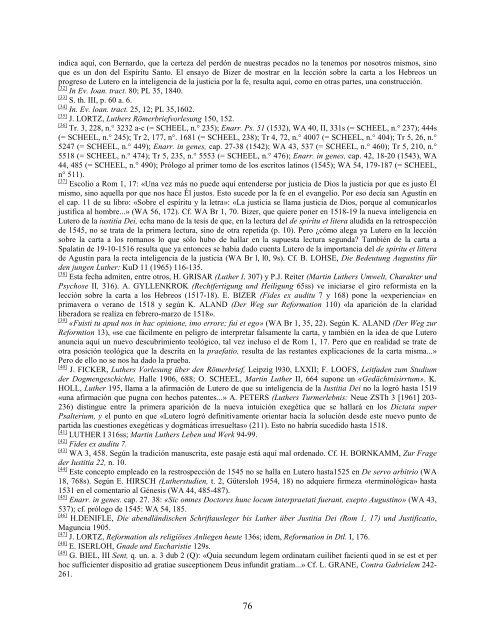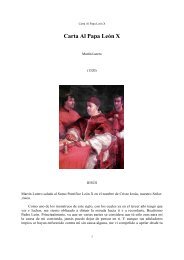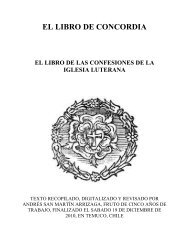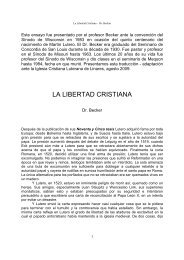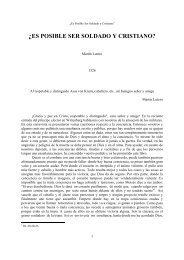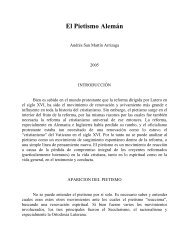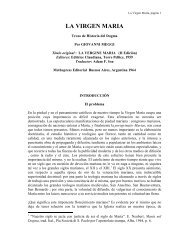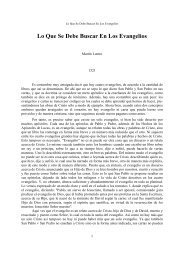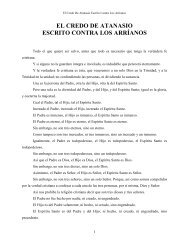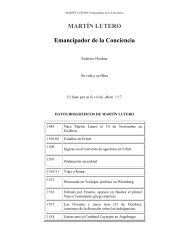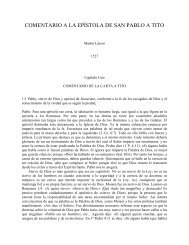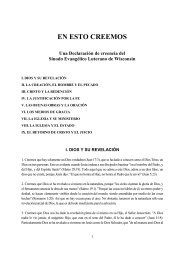martin lutero y el comienzo de la reforma - Escritura y Verdad
martin lutero y el comienzo de la reforma - Escritura y Verdad
martin lutero y el comienzo de la reforma - Escritura y Verdad
You also want an ePaper? Increase the reach of your titles
YUMPU automatically turns print PDFs into web optimized ePapers that Google loves.
indica aquí, con Bernardo, que <strong>la</strong> certeza d<strong>el</strong> perdón <strong>de</strong> nuestras pecados no <strong>la</strong> tenemos por nosotros mismos, sino<br />
que es un don d<strong>el</strong> Espíritu Santo. El ensayo <strong>de</strong> Bizer <strong>de</strong> mostrar en <strong>la</strong> lección sobre <strong>la</strong> carta a los Hebreos un<br />
progreso <strong>de</strong> Lutero en <strong>la</strong> int<strong>el</strong>igencia <strong>de</strong> <strong>la</strong> justicia por <strong>la</strong> fe, resulta aquí, como en otras partes, una construcción.<br />
[32] In Ev. Ioan. tract. 80; PL 35, 1840.<br />
[33] S. th. III, p. 60 a. 6.<br />
[34] In. Ev. loan. tract. 25, 12; PL 35,1602.<br />
[35] J. LORTZ, Luthers Römerbriefvorlesung 150, 152.<br />
[36] Tr. 3, 228, n.° 3232 a-c (= SCHEEL, n.° 235); Enarr. Ps. 51 (1532), WA 40, II, 331s (= SCHEEL, n.° 237); 444s<br />
(= SCHEEL, n.° 245); Tr 2, 177, n°. 1681 (= SCHEEL, 238); Tr 4, 72, n.° 4007 (= SCHEEL, n.° 404); Tr 5, 26, n.°<br />
5247 (= SCHEEL, n.° 449); Enarr. in genes, cap. 27-38 (1542); WA 43, 537 (= SCHEEL, n.° 460); Tr 5, 210, n.°<br />
5518 (= SCHEEL, n.° 474); Tr 5, 235, n.° 5553 (= SCHEEL, n.° 476); Enarr. in genes, cap. 42, 18-20 (1543), WA<br />
44, 485 (= SCHEEL, n.° 490); Prólogo al primer tomo <strong>de</strong> los escritos <strong>la</strong>tinos (1545); WA 54, 179-187 (= SCHEEL,<br />
n° 511).<br />
[37] Escolio a Rom 1, 17: «Una vez más no pue<strong>de</strong> aquí enten<strong>de</strong>rse por justicia <strong>de</strong> Dios <strong>la</strong> justicia por que es justo Él<br />
mismo, sino aqu<strong>el</strong><strong>la</strong> por que nos hace Él justos. Esto suce<strong>de</strong> por <strong>la</strong> fe en <strong>el</strong> evang<strong>el</strong>io. Por eso <strong>de</strong>cía san Agustín en<br />
<strong>el</strong> cap. 11 <strong>de</strong> su libro: «Sobre <strong>el</strong> espíritu y <strong>la</strong> letra»: «La justicia se l<strong>la</strong>ma justicia <strong>de</strong> Dios, porque al comunicarlos<br />
justifica al hombre...» (WA 56, 172). Cf. WA Br 1, 70. Bizer, que quiere poner en 1518-19 <strong>la</strong> nueva int<strong>el</strong>igencia en<br />
Lutero <strong>de</strong> <strong>la</strong> iustitia Dei, echa mano <strong>de</strong> <strong>la</strong> tesis <strong>de</strong> que, en <strong>la</strong> lectura d<strong>el</strong> <strong>de</strong> spiritu et litera aludida en <strong>la</strong> retrospección<br />
<strong>de</strong> 1545, no se trata <strong>de</strong> <strong>la</strong> primera lectura, sino <strong>de</strong> otra repetida (p. 10). Pero ¿cómo alega ya Lutero en <strong>la</strong> lección<br />
sobre <strong>la</strong> carta a los romanos lo que sólo hubo <strong>de</strong> hal<strong>la</strong>r en <strong>la</strong> supuesta lectura segunda? También <strong>de</strong> <strong>la</strong> carta a<br />
Spa<strong>la</strong>tin <strong>de</strong> 19-10-1516 resulta que ya entonces se había dado cuenta Lutero <strong>de</strong> <strong>la</strong> importancia d<strong>el</strong> <strong>de</strong> spiritu et littera<br />
<strong>de</strong> Agustín para <strong>la</strong> recta int<strong>el</strong>igencia <strong>de</strong> <strong>la</strong> justicia (WA Br l, l0, 9s). Cf. B. LOHSE, Die Be<strong>de</strong>utung Augustins für<br />
<strong>de</strong>n jungen Luther: KuD 11 (1965) 116-135.<br />
[38] Esta fecha admiten, entre otros, H. GRISAR (Luther I, 307) y P.J. Reiter (Martin Luthers Umw<strong>el</strong>t, Charakter und<br />
Psychose II, 316). A. GYLLENKROK (Rechtfertigung und Heiligung 65ss) ve iniciarse <strong>el</strong> giro reformista en <strong>la</strong><br />
lección sobre <strong>la</strong> carta a los Hebreos (1517-18). E. BIZER (Fi<strong>de</strong>s ex auditu 7 y 168) pone <strong>la</strong> «experiencia» en<br />
primavera o verano <strong>de</strong> 1518 y según K. ALAND (Der Weg sur Reformation 110) «<strong>la</strong> aparición <strong>de</strong> <strong>la</strong> c<strong>la</strong>ridad<br />
liberadora se realiza en febrero-marzo <strong>de</strong> 1518».<br />
[39] «Fuisti tu apud nos in hac opinione, imo errore; fui et ego» (WA Br 1, 35, 22). Según K. ALAND (Der Weg zur<br />
Reformtion 13), «se cae fácilmente en p<strong>el</strong>igro <strong>de</strong> interpretar falsamente <strong>la</strong> carta, y también en <strong>la</strong> i<strong>de</strong>a <strong>de</strong> que Lutero<br />
anuncia aquí un nuevo <strong>de</strong>scubrimiento teológico, tal vez incluso <strong>el</strong> <strong>de</strong> Rom 1, 17. Pero que en realidad se trate <strong>de</strong><br />
otra posición teológica que <strong>la</strong> <strong>de</strong>scrita en <strong>la</strong> praefatio, resulta <strong>de</strong> <strong>la</strong>s restantes explicaciones <strong>de</strong> <strong>la</strong> carta misma...»<br />
Pero <strong>de</strong> <strong>el</strong>lo no se nos ha dado <strong>la</strong> prueba.<br />
[40] J. FICKER, Luthers Vorlesung über <strong>de</strong>n Römerbrief, Leipzig l930, LXXII; F. LOOFS, Leitfa<strong>de</strong>n zum Studium<br />
<strong>de</strong>r Dogmengeschichte, Halle 1906, 688; O. SCHEEL, Martin Luther II, 664 supone un «Gedächtnisirrtum». K.<br />
HOLL, Luther 195, l<strong>la</strong>ma a <strong>la</strong> afirmación <strong>de</strong> Lutero <strong>de</strong> que su int<strong>el</strong>igencia <strong>de</strong> <strong>la</strong> Iustitia Dei no <strong>la</strong> logró hasta 1519<br />
«una afirmación que pugna con hechos patentes...» A. PETERS (Luthers Turmerlebnis: Neue ZSTh 3 [1961] 203-<br />
236) distingue entre <strong>la</strong> primera aparición <strong>de</strong> <strong>la</strong> nueva intuición exegética que se hal<strong>la</strong>rá en los Dictata super<br />
Psalterium, y <strong>el</strong> punto en que «Lutero logró <strong>de</strong>finitivamente orientar hacia <strong>la</strong> solución <strong>de</strong>s<strong>de</strong> este nuevo punto <strong>de</strong><br />
partida <strong>la</strong>s cuestiones exegéticas y dogmáticas irresu<strong>el</strong>tas» (211). Esto no habría sucedido hasta 1518.<br />
[41] LUTHER I 316ss; Martin Luthers Leben und Werk 94-99.<br />
[42] Fi<strong>de</strong>s ex auditu 7.<br />
[43] WA 3, 458. Según <strong>la</strong> tradición manuscrita, este pasaje está aquí mal or<strong>de</strong>nado. Cf. H. BORNKAMM, Zur Frage<br />
<strong>de</strong>r Iustitia 22, n. 10.<br />
[44] Este concepto empleado en <strong>la</strong> restrospección <strong>de</strong> 1545 no se hal<strong>la</strong> en Lutero hasta1525 en De servo arbitrio (WA<br />
18, 768s). Según E. HIRSCH (Lutherstudien, t. 2, Gütersloh 1954, 18) no adquiere firmeza «terminológica» hasta<br />
1531 en <strong>el</strong> comentario al Génesis (WA 44, 485-487).<br />
[45] Enarr. in genes. cap. 27. 38: «Sic omnes Doctores hunc locum interpraetati fuerant, exepto Augustino» (WA 43,<br />
537); cf. prólogo <strong>de</strong> 1545: WA 54, 185.<br />
[46] H.DENIFLE, Die abendländischen Schriftausleger bis Luther über Justitia Dei (Rom 1, 17) und Justificatio,<br />
Maguncia 1905.<br />
[47] J. LORTZ, Reformation als r<strong>el</strong>igiöses Anliegen heute 136s; i<strong>de</strong>m, Reformation in Dtl. I, 176.<br />
[48] E. ISERLOH, Gna<strong>de</strong> und Eucharistie 129s.<br />
[49] G. BIEL, III Sent, q. un. a. 3 dub 2 (Q): «Quia secundum legem ordinatam cuilibet facienti quod in se est et per<br />
hoc sufficienter dispositio ad gratiae susceptionem Deus infundit gratiam...» Cf. L. GRANE, Contra Gabri<strong>el</strong>em 242-<br />
261.<br />
76


